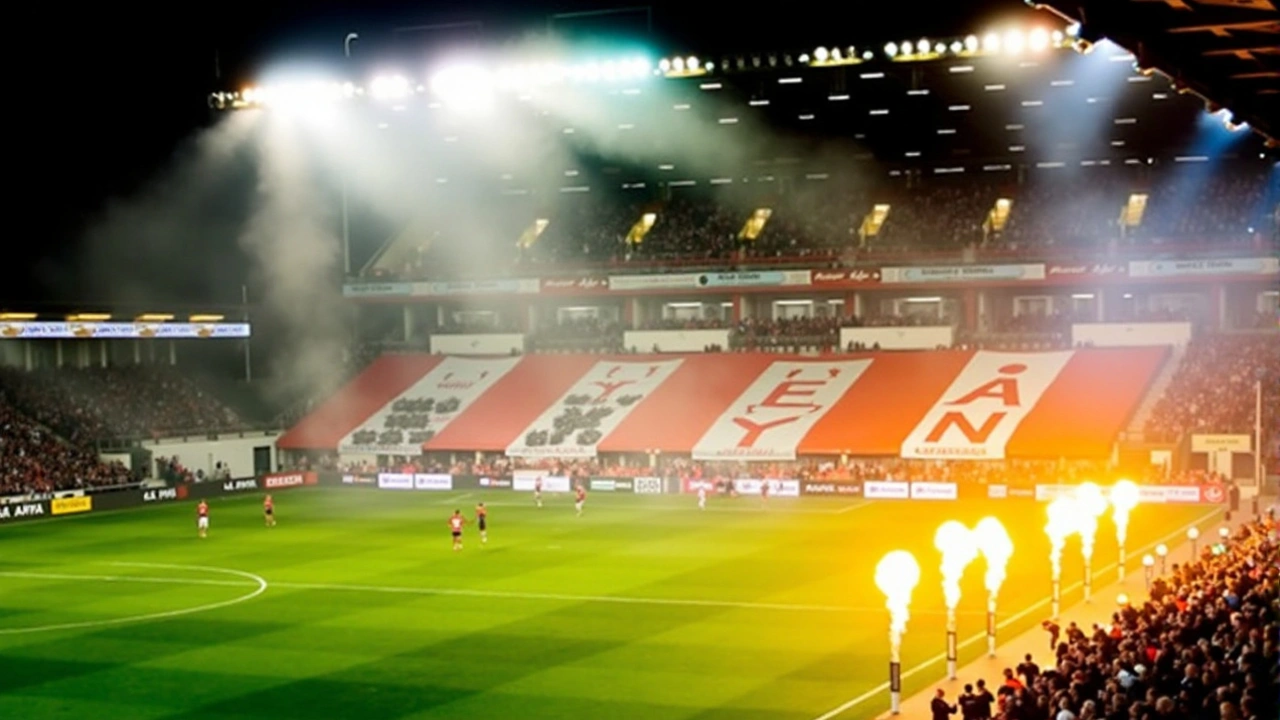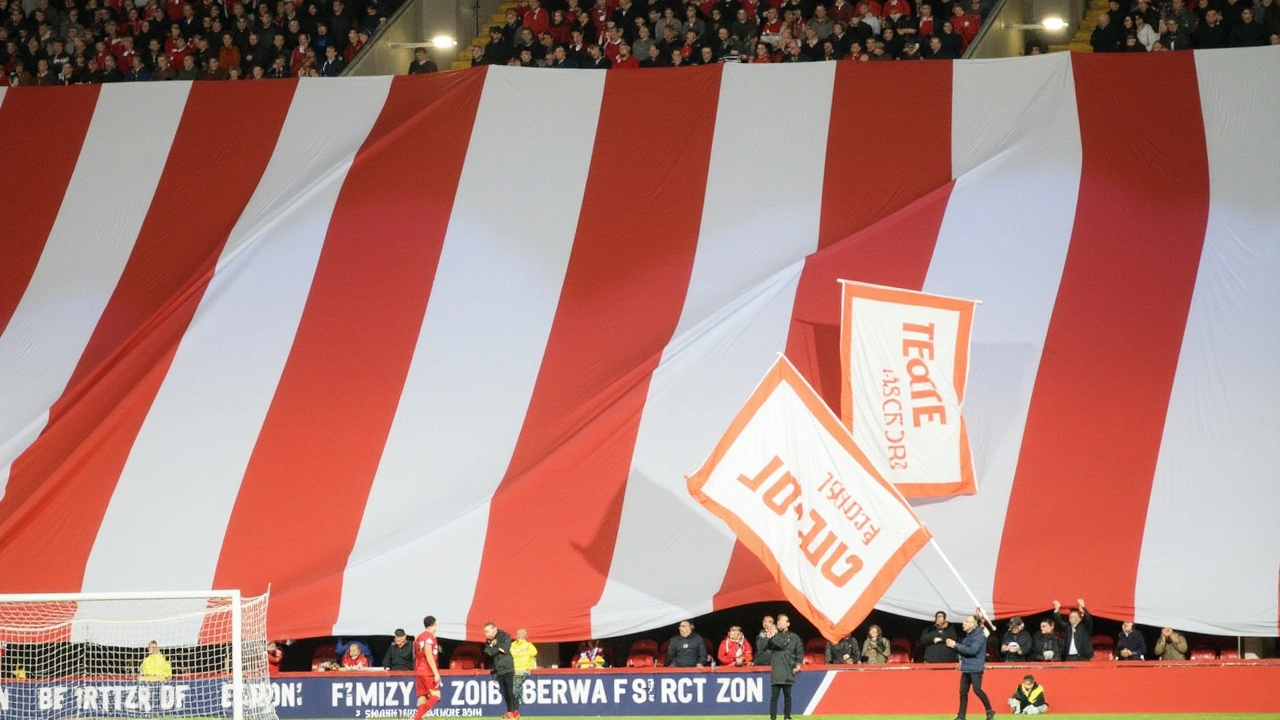Aberdeen FC's Ambitious Initiative Faces Setback
In a surprising twist of events, Aberdeen FC has decided to withdraw their application for a temporary alcohol license that was intended to elevate the pre-match experience for their loyal fans. The club had meticulously laid out plans to create a vibrant fan zone outside the iconic Pittodrie Stadium. By serving alcohol in a controlled environment from noon until 2:45 PM, just prior to kick-off, Aberdeen FC aspired to enhance the match day atmosphere, making it more interactive and enjoyable for their supporters. This move was part of a comprehensive strategy to strengthen fan engagement with the club, which has always been at the forefront of innovating the football match experience.
However, the dream was short-lived, as the club's proposed initiative quickly ran into significant legal hurdles. Under the stringent guidelines of the Criminal Justice (Scotland) Act 1980, the sale of alcohol within football grounds is strictly prohibited, except in the case of corporate hospitality sections. These regulations have often been the subject of criticism from fans and football clubs alike, as they starkly contrast with the lenient alcohol policies enjoyed by other sports, such as rugby.
Fan Base Mixed Reactions Reflect Broader Debate
Although many fans had expressed enthusiasm about the prospect of enjoying a cold beer or two before cheering on their team, Aberdeen FC was met with the challenging reality faced by other Scottish football giants such as Celtic and Rangers. Both clubs have previously attempted to introduce alcohol-inclusive events to varying degrees of success, but they too have found themselves cornered by the legal constraints. Despite the shared struggles, the Scottish government remains resolute in its stance, showing little inclination to amend the current regulations. The overarching aim of these laws is to maintain safety and order within football grounds.
Aberdeen FC's decision to retract the application has undoubtedly disappointed a segment of their fan base. Some supporters viewed this outcome as inevitable, given the tight legal framework surrounding alcohol sales at football matches. Others, however, see it as a missed opportunity to create a more vibrant and appealing match day experience. This divergence of opinions underscores a broader conversation about alcohol policies in sports, and whether football, in particular, should adapt to changes seen in other sports arenas. Rugby, for example, continues to benefit from a more relaxed approach, allowing fans to savor alcoholic beverages during matches without the legal headaches encountered by the football clubs.
The Confluence of On-Field and Off-Field Challenges
The timing of the decision coincides with Aberdeen FC grappling with several on-field challenges, adding to the club's overall strain. Most recently, the team suffered a narrow 2-1 defeat to St Mirren, ending their unbeaten run and causing further discontent within the fan community. The interplay between on-field performance and off-field policymaking highlights the various facets of club management and fan engagement that are continuously evolving.
As Aberdeen FC navigates this challenging period, they must balance the logistical and legal hurdles with the expectant desires of their fan base. The conversation surrounding alcohol regulations in football is not limited to Aberdeen alone but extends nationwide, potentially setting the stage for future discussions on reform. For now, the club must reckon with the fallout of their decision, keeping an eye on both their sports performance and the evolving regulatory landscape in Scottish football.

Looking Forward: Potential Pathways to Enhance Fan Experience
While the withdrawal of the alcohol license application marks a setback for Aberdeen FC, it may also serve as an impetus for finding innovative ways to boost fan participation and enjoyment on matchdays. There are alternative avenues that the club can explore, from enhancing the quality of non-alcoholic offerings to enriching the entertainment provided in the fan zone. What remains crucial is the club's ongoing commitment to engaging with its supporters while respecting the legal framework it operates within.
The club could potentially look to collaborate with governing bodies and other football clubs to advocate for a thoughtful reevaluation of current alcohol policies. Such a reevaluation would consider both safety concerns and the demand for comparable enjoyment experiences as seen in other sports. As with many aspects of football, the fan experience is paramount, and taking incremental steps could eventually lead to a cultural and legal shift in how alcohol—an integral part of social gatherings—is perceived within the context of Scottish football.
In conclusion, while the withdrawal of the alcohol licensing application for Aberdeen FC's fan zone is unquestionably disappointing for some, it also highlights the complexities of operating within a rigid regulatory environment. It presents an opportunity for the club and the broader football community in Scotland to engage in more profound discussions about the future of fan experiences. Through determination and collaboration, Aberdeen FC, along with other clubs, can work towards a more balanced approach that caters to the fans' desires while upholding safety and order at football events.







Nathan Roberson November 27, 2024
I get why they did it, but man, it's such a bummer. I've been to a few matches in Scotland and the vibe just isn't the same without a cold one in hand before kickoff. Not saying we need booze everywhere, but a controlled fan zone? That's common sense.
Other sports do it fine. Rugby fans aren't rioting, they're just chillin' with a pint. Why is football so scared?
Thomas Mathew November 28, 2024
This isn't about alcohol. This is about control. The state fears the crowd. The state fears unity. The state fears joy in numbers.
They let rugby fans drink because rugby fans are polite. Football fans? They're dangerous. Or so they think.
But here's the truth - the real danger isn't the beer. It's the silence. The apathy. The fans who stop coming because they're tired of being treated like children.
When you ban the beer, you ban the belonging. And that's the real loss. 🤷♂️
Dr.Arunagiri Ganesan November 28, 2024
As someone who's been to matches in India, Brazil, and now Scotland - I can tell you this: football culture isn't built on rules. It's built on passion. And passion doesn't care if you're allowed to drink a beer before the game.
But here's the thing - if you want to fix this, don't just lobby for alcohol. Fix the seating. Fix the prices. Fix the broadcast delays. Fix the arrogance of the board.
Alcohol is just the symbol. The real issue? The club feels distant. And that's what hurts more than any ban.
Frances Sullivan November 29, 2024
The Criminal Justice (Scotland) Act 1980 was enacted under specific public order paradigms that have since been empirically disproven in peer-reviewed studies on crowd behavior in sports environments. The regulatory framework is an anachronism.
Comparative analysis with UEFA member states reveals that 87% permit controlled alcohol consumption in designated fan zones. Scotland is an outlier. Not because of safety - because of institutional inertia.
Clare Apps November 30, 2024
I just want to enjoy the game without feeling like I'm being punished for showing up. It's not rocket science.
They could serve soda and snacks and still make it fun. But nooo, they gotta act like we're all gonna turn into monsters if we have a beer.
Richard Klock-Begley November 30, 2024
This is why Scottish football is stuck in the 90s. You think the fans are gonna riot over a pint? Nah. The real rioters are the bureaucrats who think they know what's best for us.
They don't get it. We don't need more security cameras. We need more atmosphere. More soul. More damn beer.
And if they won't give it to us? Fine. We'll bring our own. And they'll have to arrest half the crowd.
Nadine Taylor December 1, 2024
I know it's frustrating, but maybe we can turn this into something positive?
What if instead of focusing on alcohol, Aberdeen FC doubled down on live music, local food vendors, fan art displays, and kid-friendly zones?
There’s so much potential to make matchdays feel like a festival - not just a game. And honestly? That could bring in way more people than a beer tent ever could.
Let’s not let the loss of one thing blind us to all the other ways we can make this better.
jessica doorley December 1, 2024
While the withdrawal of the alcohol licensing application is undoubtedly a setback in terms of immediate fan engagement enhancement, it is imperative to recognize that institutional adherence to statutory frameworks remains a non-negotiable component of public safety governance.
However, this presents a strategic opportunity for Aberdeen FC to engage in proactive stakeholder dialogue with the Scottish Government, leveraging empirical data from comparable jurisdictions to advocate for evidence-based policy reform.
Collaborative stakeholder engagement, rather than adversarial posturing, will yield sustainable outcomes.
Christa Kleynhans December 2, 2024
They took away the beer but forgot we’re still here. We show up. Rain or shine. Win or lose.
And we’re not going anywhere. Not because of the license. Not because of the rules.
Because this club? It’s family. And family doesn’t need permission to feel proud.